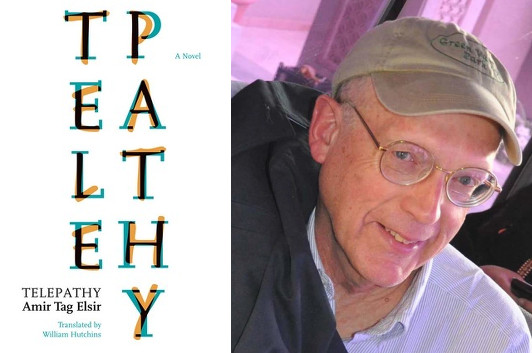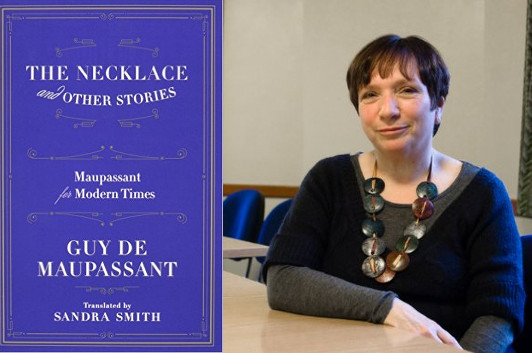William Hutchins and Amir Tag Elsir

photo: Nimah Ismail Nawwab
A famous Sudanese writer meets an annoyingly odd man at the signing for his latest novel; later, having been dragged to a lecture he doesn’t particularly care to attend, that writer sneaks out for a smoke break, only to encounter the same man—and to discover that he has the same, rather uncommon, name as a character in his book. That’s the set-up for Telepathy, the new novel from the Sudanese novelist Amir Tag Elsir, which has been translated for English-language readers by William Hutchins, who’s perhaps best known to American audiences for his translation of Nobel laureate Naguib Mahfouz’s Cairo Trilogy. And if you think you know where that set-up might be headed, you might want to think again… although, since it’s a rather short novel, it won’t take you very long to find out for yourself!
The contemporary Sudanese author Amir Tag Elsir has a gift for writing genuinely amusing and humane novels about topics like Ebola and ethnic tension in Sudan. Not gallows humor, his novels are full of antic, frolicsome wit. With carefully observed and meticulously described observations of life in Port Sudan or Khartoum, he builds hard-to-refute cases for our generic silliness, which we should embrace to achieve our full potential as human beings.
When one of Tag Elsir’s novels was short-listed for the International Prize for Arabic fiction for 2011, Samuel Shimon of Banipal, a magazine of modern Arab literature, asked me to translate an excerpt from it. That opportunity inspired me to translate the entire novel, which was published in 2012 as The Grub Hunter by Pearson Education Limited for a temporarily revived Heinemann African Writers Series, which had once published books by Tag Elsir’s late uncle, Tayeb Salih, a much admired Sudanese author. In The Grub Hunter, a police officer who once jailed subversive writers decides to write a novel himself after losing his job and a leg in a stakeout.
I also translated Amir Tag Elsir’s French Perfume for the ANTIBOOKCLUB of New York, and in March 2016 it was named to the Best Translated Book Award Fiction Longlist. French Perfume tells the story of a marginal slum’s self-appointed herald who reinvents himself when he learns a Frenchwoman may come to reside in his community as part of some international project. He falls madly in love with her internet profile, which is relayed to him by a local teenager, who has learned how to surf the web.
Sufism, Islamic mysticism, has provided literary inspiration for many Arab authors who themselves may not have been Sufi practitioners. Sudan has a rich Sufi heritage that is evident both in the name Tag Elsir and in the novel French Perfume, which can be read as an updated version of the romance between an ancient Arab poet, Majnun, who lost his mind but gained gnosis through his thwarted love for beautiful Layla. Ali Jarjar, the transformed busybody, re-enacts Majnun’s tragedy as he waits and waits for the Frenchwoman to arrive.
17 April 2016 | in translation |
How Sandra Smith Became a Translator

photo courtesy Sandra Smith
I confess that I have huge gaps in my reading of the world literary canon, including just about all the French classics. But I’ve begun to remedy that situation, at least with respect to Guy de Maupassant, thanks to The Necklace and Other Stories, a collection of stories described by its publisher, Liveright, as a “Maupassant for Modern Times.” The translator, Sandra Smith, turned out to have an interesting path to this project, a path that involves one of the biggest successes for a posthumously published novel in translation in recent memory.
As an academic teaching French language and literature at Cambridge, I was always involved with translation in a practical sense. The historians, to whom I taught grammar and translation, were required to pass a language examination at the end of the first year. My real goal, however, was to prepare them to be competent enough to use their language skills to research original sources and documents written in French.
One of my favorite texts to use was Camus’ Lettres à un ami allemand. A little-known work written during the Occupation, it is a brilliant combination of literature, philosophy, history, rhetoric and propaganda. I decided I wanted to translate the work into English and approached a publisher. After a few months, they said they thought the work “too academic” for their list, so I set the project aside.
Nearly two years later, I was listening to BBC Radio 4 and heard Rebecca Carter of Chatto & Windus talking about Suite française. I was immediately fascinated by the similarities between Irène Némirovsky’s family history and my own. More importantly, however, I was certain that a translation of Lettres would make an excellent “accompaniment” to the English publication of Suite française. It was a sign: I looked up Chatto & Windus on the internet and phoned Rebecca Carter.
During our conversation, I stressed how well the two translations would work together and Rebecca told me to send her my sample translation. We then began discussing the similarities between my own background and Némirovsky’s. I was Jewish, my grandparents had left Europe due to the pogroms and I was an immigrant myself. By the end of the conversation, Rebecca asked me if I would be interested in submitting a sample translation for Suite française, with the understanding that it was highly unlikely I would be offered the contract. She was gathering samples from established translators but the majority were men; she wanted some samples from women as well.
I had no experience whatsoever in translating fiction; my published translations at the time consisted of four chapters of a Cambridge University Press book on medieval French history, an art catalogue and some reports for the European Union. Rebecca explained that all the translators would be submitting the same chapter. (I subsequently learned that this process is known in the trade by the unfortunate label of a “beauty contest.”) One month later, I was short-listed as one of the final three candidates and asked to translate an additional few pages. I realized that the publishers would be taking an enormous risk offering this work to me when so many other experienced translators were in the running. To my great surprise, Rebecca told me I had been awarded the contract: they were prepared to take the risk.
20 December 2015 | in translation |

 Our Endless and Proper Work is my new book with Belt Publishing about starting (and sticking to) a productive writing practice.
Our Endless and Proper Work is my new book with Belt Publishing about starting (and sticking to) a productive writing practice. 
